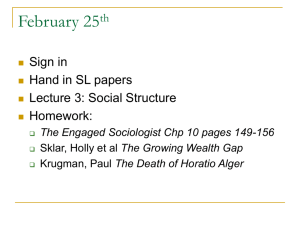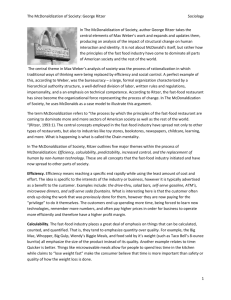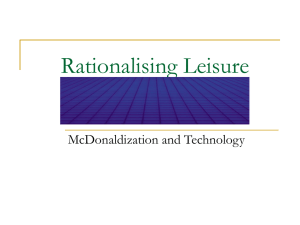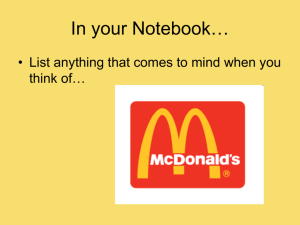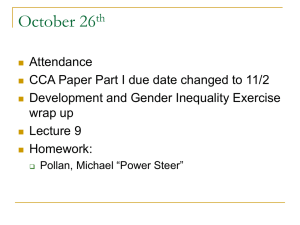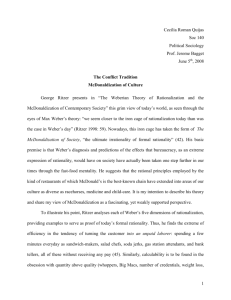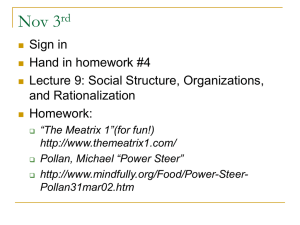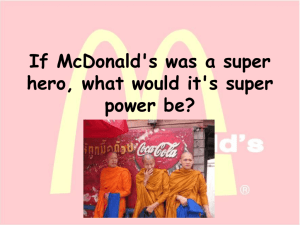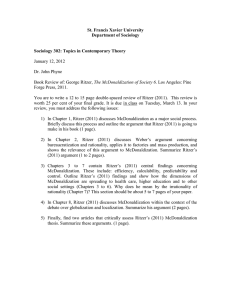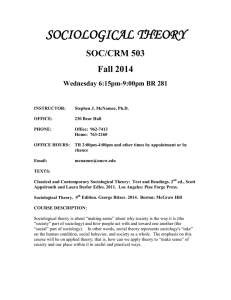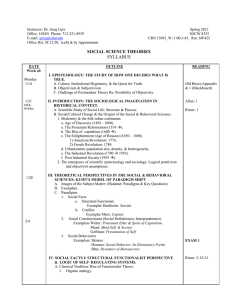Social capital
advertisement
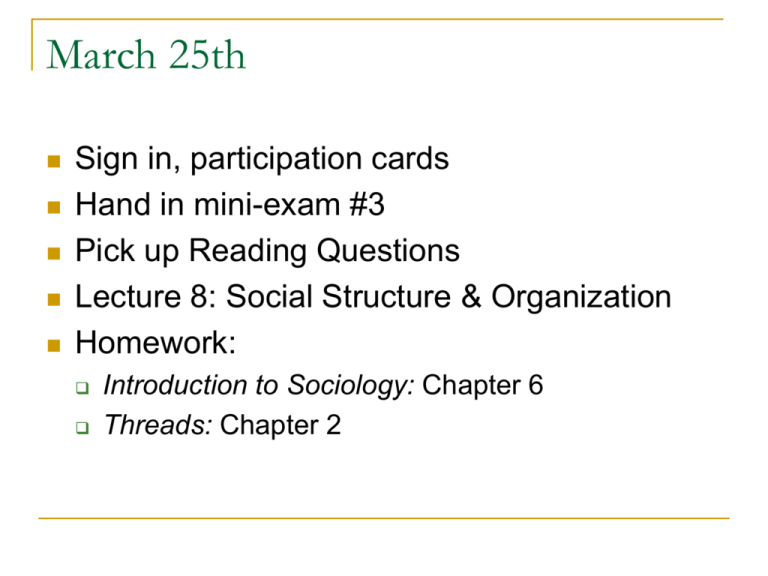
March 25th Sign in, participation cards Hand in mini-exam #3 Pick up Reading Questions Lecture 8: Social Structure & Organization Homework: Introduction to Sociology: Chapter 6 Threads: Chapter 2 Take 10 minutes & answer the following: Describe your day yesterday from the time you got up till you went to bed: Where did you go? What did you do? Why? Your social connections Who can you depend on in your life? Why? What makes you feel connected to others? Lecture 8 Social Structure & Organization Social Structure The social structure of a society – how society is organized – shapes how we are connected to others Social institutions – family, economy, education Patterns of behavior and expectations Social groups and social networks Social Groups As society becomes organized more rationality we shift social life from Primary groups Small, face-to-face, intimate, enduring sense of commitment Family To Secondary groups Large, impersonal with weak ties and short relationships Work & school Describe your day… Social Networks & Social Capital Social Networks: formal and informal ties that link people together Social capital: the social knowledge and connections that enable people to accomplish their goals and extend their influence Mutual obligation Trustworthiness Types of Social Capital Bridging Social Capital – outward looking and inclusive Unifies people across social boundaries Ex: Interfaith religious groups Bonding Social Capital – inward looking and exclusive Reinforces identities among homogeneous groups Ex: Fraternities and Sororities Your Social Connections… Who can you depend on in your life? Why? What makes you feel connected to others? How does technology affect our social capital and our connections to others? According to the text book, technology, such as the Internet, allows us to extend our social networks around the world to reach like minded people What effect has technology had on your social connections? Group Work How do Internet social networking websites like MySpace & Facebook affect our social capital and our connections to others? Group 1: Argue that it is positive Group 2: Argue that it is negative How do cell phones and text-messaging (twitter?) affect our social capital and our connections to others? Group 3:Argue that it is positive Group 4: Argue that it is negative “Returning to our original research question, we can definitively state that there is a positive relationship between certain kinds of Facebook use and the maintenance and creation of social capital. Although we cannot say which precedes the other, Facebook appears to play an important role in the process by which students form and maintain social capital . . . Our participants overwhelmingly used Facebook to keep in touch with old friends and to maintain or intensify relationships characterized by some form of offline connection such as dormitory proximity or a shared class. “ Ellison et al. The Benefits of Facebook ‘Friends:’ Social Capital and College Students’ Use of Online Social Network Sites Moving beyond social categories of difference? The book argues that this networking allows people to connect based on shared interests without the social influence of class, race/ethnicity, gender, and other social categories Do you think this is true? Rationalization Rationalization: process by which thought and action are no longer rooted in emotion, tradition, but become rooted in ‘value-rational’ thought and action Value –system (culture) Institutional Organization The Cow Hindus – symbol of everything alive McDonalds – “means to an end” McDonaldization of Society McDonaldization: “process by which the principles of the fast food restaurant are coming to dominate more and more sectors of society” – George Ritzer Efficient Quantification Predictability Non-human Technology Efficiency Efficiency is the choosing the fastest means to an end, with the least amount of cost or effort. The idea of efficiency is specific to the interests of the industry or business, but is typically advertised as a benefit to the customer. Examples: the drive-up window, self-serve gasoline, ATM's, The customer often ends up doing the work that previously was done for them. We end up spending more time, being forced to learn new technologies, remember more numbers, and often pay higher prices Quantification & Calculation Quantification “involves an emphasis on things that can be calculated, counted, quantified. Quantification refers to a tendency to emphasize quantity rather than quality. This leads to a sense that quality is equal to certain, usually (but not always) large quantities of things." (Ritzer 1994:142) Examples of this element include: the "Big Mac," the Whopper," "Big Gulp," Wendy's "Biggie Meals," The credentialing process. Predictability Predictability refers to the attempt to structure our environment so that surprise and difference do not encroach upon our sensibilities. Rational people need to know what to expect. They want to be sure that the fun, satisfaction, taste, and benefits they received last week in Cincinnati will be repeated next week in San Diego. A Big Mac is a Big Mac is a Big Mac. Non-human Technology Non-human Technology: Everything is prepackaged, pre-measured, automatically controlled. The human employee is not required to think, just follow the instructions and push a button now and then. "The next step in this development is to have the customer do the scanning,..." (Ritzer 1994:150). What this means is that the skills and capabilities of the human actor are quickly becoming things of the past. Who we are and how we interact is becoming defined by our dependence upon and subordination to the machine. Irrationality Rational systems → irrational outcomes "Most specifically, irrationality means that rational systems are unreasonable systems. By that I mean that they deny the basic humanity, the human reason, of the people who work within or are served by them." – George Ritzer A social problem? How do you think McDonalidization affects our connections social capital and connections to others? Bridging & Bonding Social Capital?
